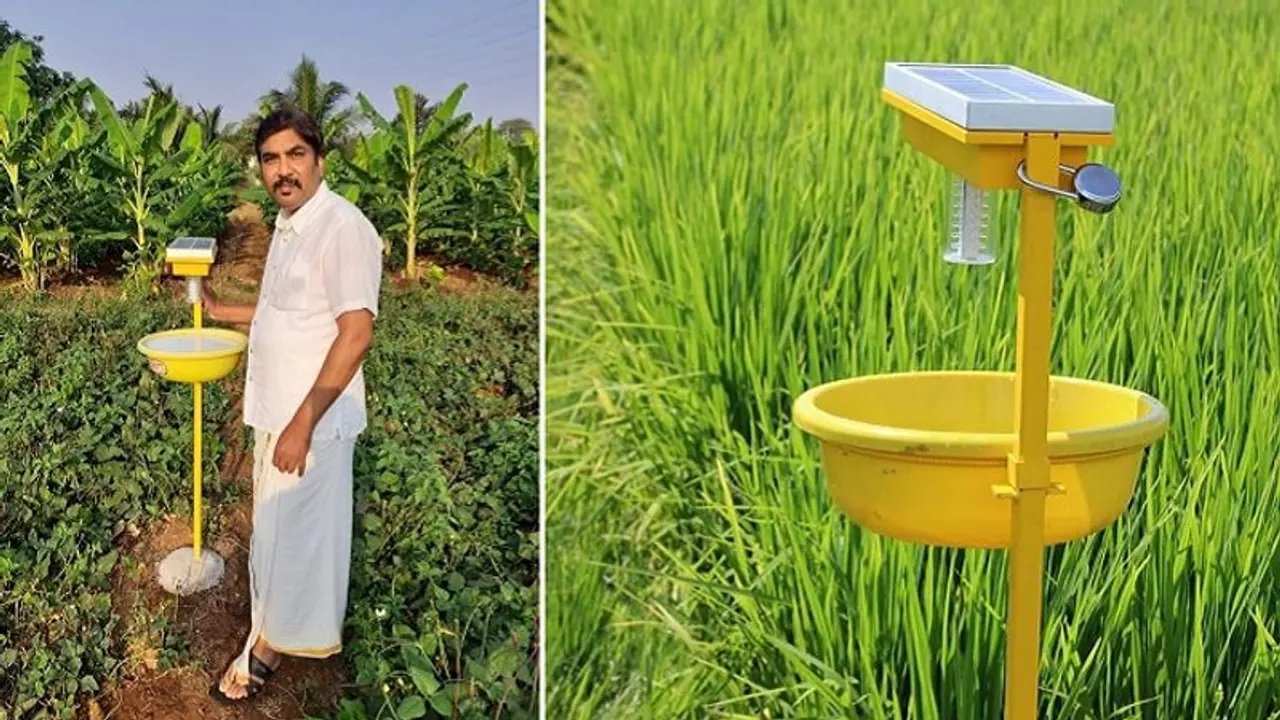In recognition of the innovative solution, the Infosys Foundation awarded Karibasappa the Aarohan Award in 2019. The ‘solar insect trap’ serves as a natural insect killer, significantly reducing the need for pesticides in the fields by 70 to 80 percent.
Bangalore. Karibasappa MG is a farmer hailing from a small village located in the Davanagere district of Karnataka. His innovation of ‘solar insect trap’ is earning him significant attention. Recounting his journey, Karibasappa shares that he found it financially challenging to use pesticides in his fields. Insect infestation significantly affected his yield, causing damage to the crops. To find a solution to the problem, he performed several experiments, and came up with the idea of ‘solar insect trap.’ Today, he sells his products in six different countries.
Enduring challenges
Karibasappa MG completed his class 10 in the year 1980. He aspired to pursue higher studies, but due to the family’s financial constraints, he became involved in farming. At the time, he cultivated sugarcane with his family. In an effort to boost profits, he shifted the focus to horticulture crops. In 2012, the made the decision to cultivate pomegranates. Insects damaged his crops severely, and the profits were hindered. Other farmers suggested him to use pesticides. He found himself spending Rs 4 to 5 lakh on chemicals. Since he had no money on him, he had to take a loan to get the needful done. As a result, the financial debt weighed heavily on him.
Seeking expert’s advice
Karibasappa MG engaged in several experiments to develop a method on his own. He installed a solar bulb inside a small hut in his field. One evening, he noticed insects gathering around the bulb. He placed a bucket of water beneath the light source, and the following morning, he discovered 50 to 100 insects trapped in the water-filled bucket. Impressed by the positive results, he sought further advice from the scientists at the ICAR-Taralabalu Krishi Vigyan Kendra in Davanagere. The experts suggested conducting experiments by using bulbs of different colours at varying heights.
Developing the model
It took nearly a year for Karibasappa to develop the first cost-effective model of the solar insect trap. The first model included a 10 W solar panel and a 12 V battery, which proved to be costly. The battery also required frequent changing which added to the expenses. Karibasappa enhanced the design by incorporating a 5 W solar panel and a lithium battery. This new model significantly reduced the costs. The model also features an ultraviolet LED light connected to a solar panel for efficient insect trapping.
Receiving recognition
Karibasappa MG shares that the ‘solar insect trap’ is equipped with a timer, allowing it to automatically turn on in the evening and turn off at 10 pm. The device consumes only one unit of electricity per acre of land in a month. In recognition of this innovative solution, the Infosys Foundation awarded Karibasappa the Aarohan Award in 2019, with an additional cash prize of Rs 5 lakh. The model serves as a natural insect killer, significantly reducing the need for pesticides in the fields by 70 to 80 percent. Karibasappa was also honoured with the Krishi Pandita Award by the Agriculture Department of Karnataka.
Company’s turnover
Today, Karibasappa’s products are being sold in six countries including Nepal, the UK, and Australia. Indian farmers living in the UK and Australia are among the top customers purchasing the product. Karibasappa has also ensured adherence to international standards in the production. Presently, the company’s turnover exceeds Rs 2 crore.
